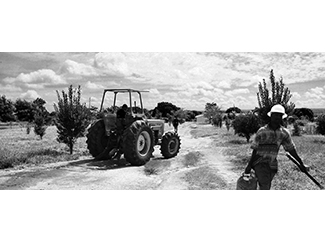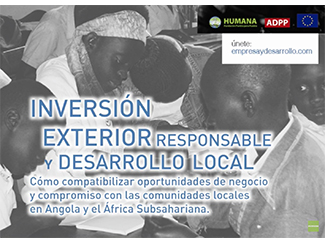consent_cookie
Duración: 1 year
Stores the user's cookie consent state
12-11-2015
On Tuesday, November, 17, the foundation, Casa Africa, Codespa and the Research Park of the Autonomous University of Barcelona discussed in Madrid on this new stage of responsible investment, with particular attention to sub-Saharan Africa and Angola in the meeting 'Responsible Investment and Local Development '.
The so-called "international development" is evolving rapidly. The paradigm of poor countries that need help, and rich countries should help, it is no longer valid. Part of developing countries have achieved sufficient economic growth to be considered by the World Bank as middle-income.
However, the vast majority of people in these developing countries have not benefited from the wealth generated by this economic growth. Although governments need to enhance the distribution of that wealth, also the world of business has to reflect on its role in society. Perhaps partly for that reason, but also for many other reasons, the Sustainable Development Goals, our agenda for the next 15 years, highlight the essential role played by companies in local development.
Capitalism conscious and responsible investment
At the same time, we are witnessing a gradual but important in traditional business models change. Principles as the conscious capitalism, responsible investing, social enterprises and inclusive value chains are gaining weight. Partly because it is socially and ethically correct, and partly because consumers demand it. But also because the most profitable and sustainable long-term approach is incorporating social and environmental factors in their strategies and processes.
Socially responsible investing involves incorporating ethical, social and environmental process of making investment decisions, complementary to traditional financial criteria of liquidity, profitability and risk criteria mode.
Combine business interests, profitability and development of the communities is possible. That is the weight that has acquired CSR in the business strategy of many organizations, not as a part of marketing, but as a global business philosophy, objectives.
As businesses are the main source of job and wealth they have an essential and central role in local development. The key is that the relationship established with the societies and communities when they invest is not unidirectional.
Communities that have greater development thanks to have an appropriate educational level and higher income levels, are those that offer greater business opportunities for companies and therefore contribute to its growth.
Therefore, the company is gaining weight as an actor growth in developing countries, especially in the current global scenario of post-recession and reduced public spending on international cooperation. This scenario requires the private sector involved heavily in the development of low- and middle-income.
Open communities to change
If we look at communities in developing countries, we realize that do not meet traditional expectations we have, because they are not opposed to change and do not cling to certain traditionalism. In fact we perceive which are made by small entrepreneurs and entrepreneurs that are often used to reinvent and innovate. The big difference is that they have fewer resources available to grow, both as potential customers as members of the value chain.
If capitalism and the free market economy look like they are the least bad system, it's time to talk about responsible and sustainable capitalism and market economy.
Global sustainability by working organizations like Humana action should combine both from the realm of the public and the private. The collaboration between the two spheres is essential, on the basis of business interests and community development are compatible.
On November 17, Humana organized the meeting 'Responsible foreign investment and local development' in which these ideas will be addressed in the context of sub-Saharan Africa and in particular from Angola. The meeting is part of the project 'Increasing food security and production activities 1,000 families in rural areas of Cabinda, Angola', financed by the European Union and implemented by the Foundation and its local partner ADPP. You can find more information in www.empresaydesarrollo.com
-


